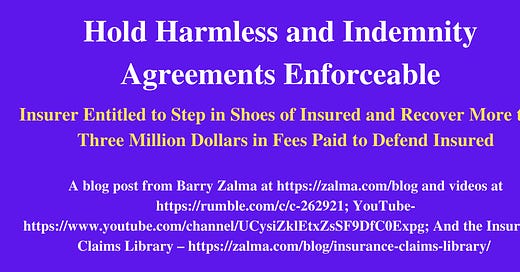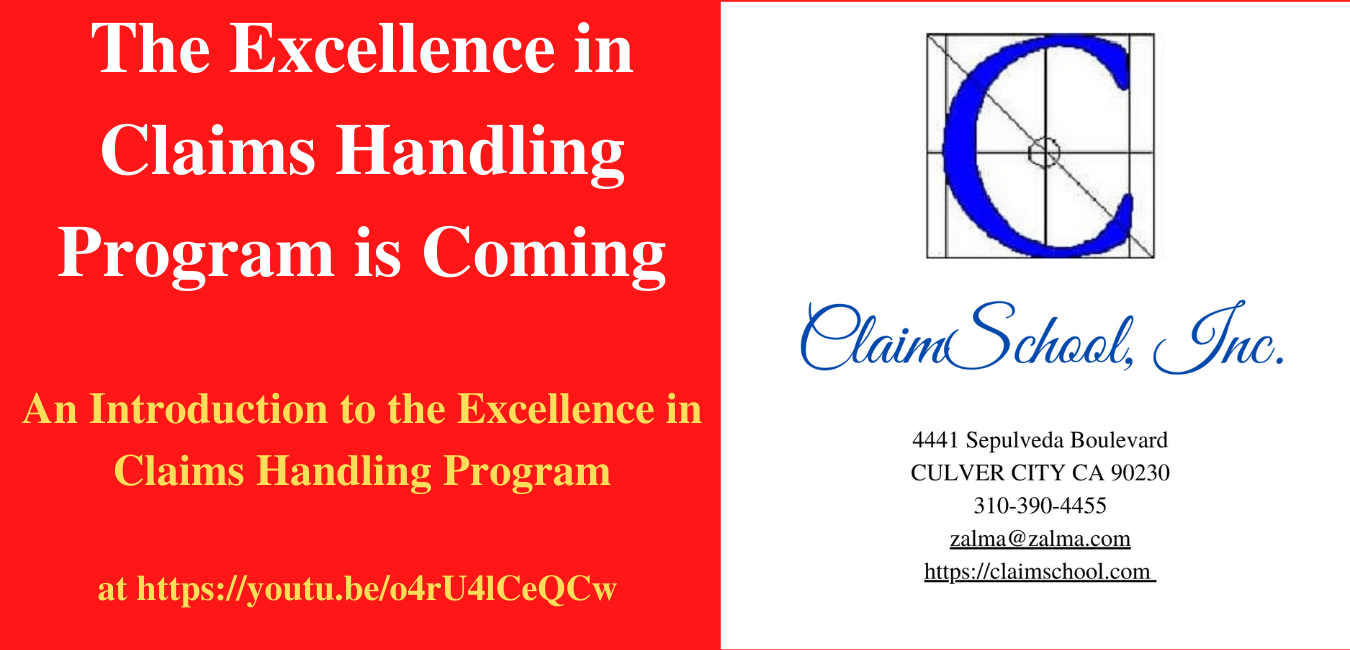Insurer Entitled to Step in Shoes of Insured and Recover More than Three Million Dollars in Fees Paid to Defend Insured
Hold Harmless and Indemnity Agreements Enforceable
Read the full article at https://www.linkedin.com/pulse/hold-harmless-indemnity-agreements-enforceable-barry-zalma-esq-cfe and at https://zalma.com/blog plus more than 3900 posts.
In Sentinel Insurance Company, Ltd. v. VLM Foods, Inc., et al., No. 1:19-cv-1395(LMB/TCB), United States District Court, E.D. Virginia, Alexandria Division (October 1, 2021 Sentinel Insurance Company, Ltd. (“plaintiff or “Sentinel”) defended its insured TSC in more than 25 lawsuits arising out of the hepatitis A virus (HAV) outbreak and in paying some settlements. Sentinel seeks express indemnification for those fees, costs, and payments from defendants VLM Foods, Inc. (“defendant” or “VLM”), a Canadian entity, and Patagonia Foods, LLC (“defendant” or “Patagonia”), a Californian entity. Both entities were upstream links in a frozen strawberry distribution chain that carried HAV.
BACKGROUND
In this action, Sentinel “seeks to prosecute [TSC’s] right[s]” of recovery against VLM and Patagonia. Sentinel seeks recovery under a theory of “Express Indemnity,” based on its insurance policy covering TSC and three agreements: the VLM-Patagonia agreement, the Patagonia-Sysco agreement, and the Patagonia-ITI agreement.
Sentinel Insurance Policy
Condition 8(a) of the Policy, titled Transfer of Rights of Recovery, provided: “If the insured has rights to recover all or part of any payment, including Supplementary Payments, we have made under this Coverage Part, those rights are transferred to us. The insured must do nothing after loss to impair them. At our request, the insured will bring ‘suit’ or transfer those rights to us and help us enforce them….”
Sentinel stands in the shoes of TSC for purposes of this lawsuit, in which Sentinel now seeks to recover $3,548,292.90, comprised of $3,342,989.41 in attorney’s fees it incurred in defending TSC against the underlying HAV claims, $187,636.82 in associated litigation expenses, and $17,666.67 it paid to resolve three underlying HAV claims, as well as prejudgment interest on these amounts. Although VLM opposed the damage amount in its motion for summary judgment as to Sentinel’s complaint, during oral argument it admitted that it was not contesting the amount. Patagonia has not contested the amount.
Distribution Chain
TSC is a nationwide franchisor of cafes specializing in smoothies. TSC created the supply and distribution chain for the frozen strawberries at issue in this civil action. TSC franchise agreements and documents require TSC franchisees to purchase frozen fruit in accordance with the guidelines, specifications, and approved supplier, distributor, and vendor lists issued by TSC.
Patagonia acts as a wholesale seller of frozen produce, including frozen strawberries. Since 2006, Patagonia has sourced roughly 100 million pounds of frozen fruits, including strawberries, for TSC, which is equivalent to roughly $100 million of business. Although during the period at issue there was no formal written agreement between them, Patagonia and TSC regularly communicated, negotiated, and reached agreements regarding food product specifications and details, quality control issues, their business relationship, the policies and procedures that applied to that relationship, TSC’s supply chain and distribution needs, Patagonia’s ability to fulfill those needs, projections of TSC’s annual use of frozen fruits, frozen fruit pricing, TSC’s marketing efforts, potential new menu items for TSC to provide its franchisees, and the general state of the frozen fruit industry. Patagonia does not have these types of business communications with TSC franchisees.
In 2015, TSC and Patagonia entered into a written bulk purchasing arrangement for frozen strawberries under which Patagonia agreed to supply a particular type of strawberry for use in TSC’s franchises, which included the frozen strawberries at issue in this civil action. To fulfill this arrangement, on September 14, 2015, Patagonia sent VLM-a global frozen food vendor, processor, and distributor based in Canada-a purchase order for 60 loads of individually quick-frozen strawberries from Egypt. That same day, VLM sent Patagonia an executed sales confirmation for the 60 loads (3.168 million pounds) of frozen strawberries.
HAV Outbreak
In the late summer and early fall of 2016, several state health agencies, the Centers for Disease Control and Prevention (“CDC”), and the U.S. Food & Drug Administration (“FDA”) (collectively, “public health officials”) identified and investigated an HAV outbreak. Public health officials identified 129 individuals-54 of whom were hospitalized-who acquired HAV infections as a result of consuming smoothies or other food items purchased from certain TSC locations that were made from or exposed to frozen strawberries. No deaths were identified. The FDA tested 19 samples of strawberries, six of which originated from ICAPP and tested positive for HAV. The FDA’s trace-back investigation concluded that the frozen strawberries served at the implicated TSC franchisees originated from ICAPP. In October 2016, ICAPP voluntarily recalled frozen strawberries imported into the United States starting January 1, 2016.
As a result of this HAV outbreak, dozens of state court lawsuits and two federal class actions were filed, and over 200 claims were asserted against TSC and various TSC franchisees.
Hold Harmless Agreements
Patagonia had three agreements relevant to the issues in this civil action. First, it had a Hold Harmless Agreement and Guarantee/Warrantee of Product (“VLM-Patagonia agreement”) with VLM, which was signed by VLM at its headquarters in Canada and sent to Patagonia in relation to Patagonia’s purchase of pineapple from VLM’s La Paz production facility in Costa Rica. The VLM-Patagonia agreement provided, in part to guarantee that the strawberries were not adulterated or misbranded within the meaning of the Federal Food, Drug and Cosmetic Act (the “Act”) and (b) to not be an article which cannot be introduced into interstate commerce.
The seller also agreed to defend, indemnify and hold harmless Buyer and its employees, representatives, directors and customers (Individually an “Indemnitee”) from all actions, suits, claims, demands and proceedings, (“Claims”), and any judgments, damages, losses, debts, liabilities, penalties, fines, costs and expenses (including reasonable attorney’s fees), resulting therefrom whether arising out of contract, tort, strict liability, misrepresentation, violation of applicable law and/or any cause whatsoever.
DISCUSSION
VLM’s Liability to Sentinel
Under the VLM-Patagonia agreement, VLM guaranteed the quality of goods it sold to Patagonia and agreed to indemnify Patagonia (the buyer). Under these facts, no reasonable jury could find that TSC was not a customer of Patagonia under either party’s proffered definition. Patagonia considered TSC its “customer,” and therefore VLM must indemnify TSC according to the terms of the VLM-Patagonia agreement.
The VLM-Patagonia agreement applies to the frozen strawberries shipped to Patagonia by VLM, and under that agreement VLM is required to indemnify TSC, which the Court finds is a customer of Patagonia.
Patagonia’s Liability to Sentinel
Patagonia’s liability to Sentinel is governed by the Patagonia-Sysco and Patagonia-ITI agreements. Using essentially the same language as the VLM Agreement, the Patagonia-Sysco agreement contains a promise by Patagonia to indemnify and defend Sysco and its “customers” from claims and suits “alleged to have arisen out of (a) the delivery, sale, resale, labeling, use or consumption of any Product,” and like the VLM Agreement, this one is also signed only by the party against whom the hold harmless obligations are to be enforced, in this case, Patagonia.
Whether Sentinel Can Recover Under the Voluntary Payment Doctrine
The voluntary payment doctrine, as established under Virginia common law, provides that where a party pays an illegal demand with full knowledge of all the facts which render such demand illegal such payment must be deemed voluntary, and cannot be recovered back. However, since Sentinel was obligated under the insurance policy to defend TSC against the HAV claims, the voluntary payment doctrine did not bar Sentinel’s recovery in this litigation.
Liability Between Patagonia and VLM
The court concluded that Patagonia and VLM are jointly and severally liable to Sentinel, standing in place of TSC, for the costs and fees it has incurred in the HAV litigation and in this litigation. Moreover, under the VLM-Patagonia agreement, VLM must indemnify Patagonia for Patagonia’s liability to Sentinel, as well as its litigation costs. For these reasons, Patagonia prevails on its crossclaim against VLM for indemnification of any damages it has incurred in connection with the litigation concerning the HAV lawsuits, as well as its attorney’s fees and costs incurred in this litigation, if those fees and costs are sought.
CONCLUSION
Sentinel’s summary judgment motion against Patagonia and VLM was granted, and Patagonia’s and VLM’s cross-motions for summary judgment against Sentinel were denied. As a result, VLM and Patagonia are jointly and severally liable to Sentinel in the amount of $3,548,292.90, plus pre-judgment interest.
Patagonia’s summary judgment motion against VLM was granted, and VLM’s cross-motion for summary judgment on Patagonia’s crossclaim was denied. As a result, VLM must indemnify Patagonia for Patagonia’s liability to Sentinel, and if Patagonia seeks reimbursement for its attorney’s fees and costs incurred in this litigation, VLM will be liable for those fees and costs to the extent they are found to be reasonable.
ZALMA OPINION
This case teaches the importance of hold harmless and indemnity agreement in commercial transactions. The insurer, Sentinel, was required to defend its insured and then, properly sought reimbursement of the attorney fees it paid to defend its insured from the suppliers who agreed to hold harmless and indemnify its insured. Every liability claim investigation requires a determination of the existence of such contract and, if they are there, the insurer should obtain the indemnity that its insured would have obtained if it had no insurance.
Subscribe to Excellence in Claims Handling at https://barryzalma.substack.com/welcome.
© 2021 – Barry Zalma
Barry Zalma, Esq., CFE, now limits his practice to service as an insurance consultant specializing in insurance coverage, insurance claims handling, insurance bad faith and insurance fraud almost equally for insurers and policyholders.
He also serves as an arbitrator or mediator for insurance related disputes. He practiced law in California for more than 44 years as an insurance coverage and claims handling lawyer and more than 54 years in the insurance business.
He is available at http://www.zalma.com and zalma@zalma.com. Mr. Zalma is the first recipient of the first annual Claims Magazine/ACE Legend Award. Over the last 53 years Barry Zalma has dedicated his life to insurance, insurance claims and the need to defeat insurance fraud. He has created the following library of books and other materials to make it possible for insurers and their claims staff to become insurance claims professionals.
Go to training available at https://claimschool.com; articles at https://zalma.substack.com, the podcast Zalma On Insurance at https://anchor.fm/barry-zalma; Follow Mr. Zalma on Twitter at https://twitter.com/bzalma; Go to Barry Zalma videos at https://www.rumble.com/zalma ; Go to Barry Zalma on YouTube- https://www.youtube.com/channel/UCysiZklEtxZsSF9DfC0Expg; Go to the Insurance Claims Library – https://zalma.com/blog/insurance-claims-library/ The last two issues of ZIFL are available at https://zalma.com/zalmas-insurance-fraud-letter-2/ podcast now available at https://podcasts.apple.com/us/podcast/zalma-on-insurance/id1509583809?uo=4






